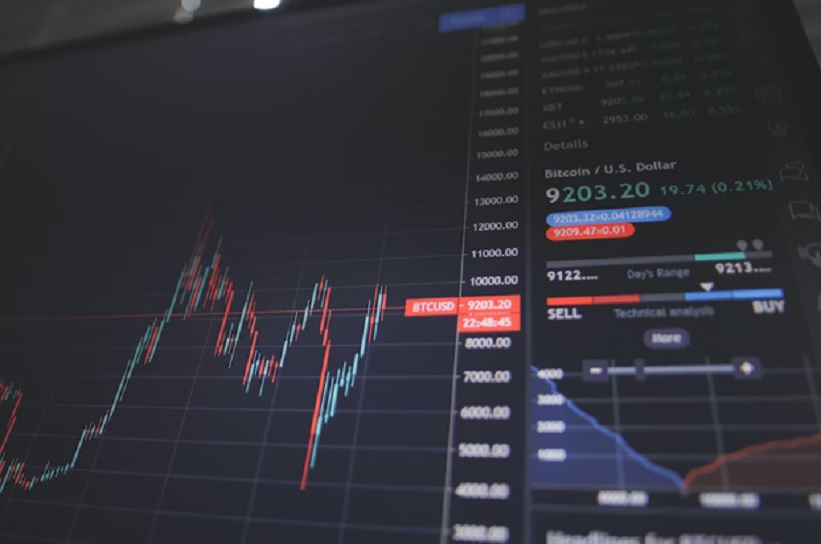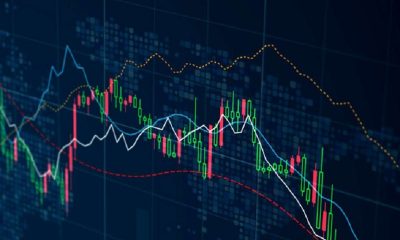Economy
Mastering The Art Of Crypto Trading: Key Tips To Follow

Are you interested in getting involved in the crypto trading market? It’s no secret that cryptocurrency trading has been on the rise for a while now, and as more people become interested in this exciting new field, it is ever more important to stay informed. There are many key components to mastering the art of crypto trading which must be considered if you want to make successful trades.
In this blog post, we will provide some insightful tips that seasoned investors have used throughout their respective careers to ensure success when entering or exiting the markets. By understanding these core concepts and implementing them into your own personal strategies, you can make sure that your investments pay off handsomely.
Understanding how crypto trading works and the different types of markets
Cryptocurrency is all the rage these days, with more and more people diving into the world of trading. But before you start investing, it’s important to understand how it all works. Crypto trading involves buying and selling digital assets using a decentralized platform. These digital assets are also known as cryptocurrencies, and they function as a means of exchange, just like traditional currencies.
There are different types of markets in which these digital assets are traded, and they all have their unique characteristics. From spot trading, and futures trading, to options trading, it’s important to understand the differences between them to make informed decisions. So, buckle up, and let’s dive into the world of crypto trading!
Evaluating trends in the crypto market to inform your trading decisions
The world of cryptocurrency trading can be a tricky one to navigate, with so many different factors influencing the value of various digital coins. Whether you’re new to the game or an experienced trader, it’s always a good idea to keep an eye on the latest trends and developments in the market in order to make informed decisions.
By analyzing patterns over time and staying up to date with news and industry changes, you can better understand how the market is likely to shift in the coming weeks and months. Of course, there are websites like Peak Crypto, and other similar ones, on which you can always get more info on how to act with crypto. Not only will this help you stay ahead of the curve, but it can also give you insights into potential entry and exit strategies.
Developing a strategy for trading with crypto assets
The world of crypto assets can be a challenging one to navigate, but with the right strategy in place, it can also be incredibly rewarding. Developing a solid plan for trading with crypto assets is key to success, and it starts with understanding the market and its volatility. It’s also important to have a clear understanding of your own risk tolerance and investment goals.
Once you have these basics in place, you can start exploring the different trading strategies that are available to you, from swing trading to day trading to long-term investments. The key is to be patient, disciplined, and always willing to learn and adapt as the market evolves. With the right strategy and approach, trading with crypto assets can be a thrilling and profitable adventure.
Identifying reliable sources to get up-to-date information on cryptocurrencies
Cryptocurrencies have become increasingly popular in recent years, but with so much information available online, it can be difficult to separate fact from fiction. Therefore, it’s essential to identify reliable sources to stay up-to-date on the latest developments in this rapidly evolving industry.
Seeking out reputable news outlets, such as Bloomberg or Reuters, and following established experts in the field, like industry thought leaders and reputable Twitter accounts will help you ensure that you’re receiving accurate and trustworthy information. Ultimately, educating yourself on cryptocurrencies through reliable sources is crucial if you want to make informed decisions in this exciting but volatile market.
Managing risk by setting stop losses, placing take profits, and diversifying your portfolio
As an investor, managing risk is a crucial part of your success. One method to do so is by setting stop losses, which means setting an order to sell an asset when it reaches a specific price. This helps you to limit losses if a trade goes against you. Another technique is placing take profits, where you set an order to sell an asset after it reaches a certain level of profit. This way, you can secure gains earned from successful trades.
And, diversifying your portfolio can also reduce risk by investing in a range of assets, spreading out your investments, and reducing the exposure to any single security. Incorporating these strategies can help to mitigate risk, and enhance the resiliency of your portfolio.
Exploring tools and services available to traders to optimize their trading process and improve results
As technology continues to advance, traders have access to a wide range of tools and services that can greatly improve their trading experience. From robust trading platforms to sophisticated analytical software, there are many ways for traders to optimize their strategy and achieve better results. Whether you’re a seasoned trader or just starting out, knowing how to leverage these tools effectively is key.
Not only can these tools help you make smarter investment decisions, but they can also save you time and improve your overall trading process. So take the time to explore the various options available to you, and see how you can use them to take your trading game to the next level.

Crypto trading can be complex and overwhelming at times, but it can also be an exciting and rewarding activity with the right mindset and attitude. Having a good understanding of crypto trading markets, trends, and the underlying technology is essential to maximizing your potential success. Having the right resources to inform your decision-making and taking on the correct risk management measures are key to protecting your assets and minimizing losses.
Ultimately, trading in the crypto market requires discipline, caution, and knowledge – all of which you can develop by researching sources such as news sites, keeping track of trends, and building a portfolio according to your risk appetite. Armed with this information coupled with interactive tools and services for traders you should grow your portfolio safely in no time!
Economy
Stock Market Gains N2.367trn as All-Share Index Rises 2.06%

By Dipo Olowookere
The Nigerian Exchange (NGX) Limited appreciated by 2.06 per cent on Friday, amid a rush for local equities due to encouraging earnings of companies for 2025.
Business Post reports that the buying pressure was across the key sectors of Customs Street yesterday, with the banking index growing by 2.49 per cent. The energy industry appreciated by 2.05 per cent, the consumer goods counter grew by 0.78 per cent, the insurance space improved by 0.64 per cent, and the industrial goods sector expanded by 0.44 per cent.
At the close of trades, the market capitalisation went up by N2.367 trillion to N117.027 trillion from N114.660 trillion, and the All-Share Index (ASI) gained 3,687.45 points to close at 182,313.08 points compared with the previous day’s 178,625.63 points.
Cornerstone Insurance, Infinity Trust, and Nestle Nigeria appreciated by 10.00 per cent each to sell at N6.38, N9.90 and N2,662.00, respectively, while Okomu Oil rose by 9.99 per cent to N1,327.00, with RT Briscoe up by 9.97 per cent to N17.42.
Conversely, SAHCO depleted by 10.00 per cent to M135.00, Guinness Nigeria lost 9.97 per cent to trade at N103.00, Omatek shrank by 9.39 per cent to N2.99, NPF Microfinance Bank decreased by 6.51 per cent to N5.60, and eTranzact slipped by 6.33 per cent to N10.80.
A total of 53 stocks ended in the green side and 33 stocks finished in the red side, representing a positive market breadth index and strong investor sentiment.
Data showed that 936.4 million shares valued at N52.7 billion were transacted in 50,068 deals on Friday versus the 698.3 million shares worth N28.438 billion traded in 50,886 deals on Thursday, indicating a rise in the trading volume and value by 34.10 per cent, and 85.56 per cent apiece, and a slip in the number of deals by 1.61 per cent.
First Holdco closed the session as the most active equity with 106.3 million units worth N5.1 billion, Zenith Bank transacted 72.6 million units valued at N5.7 billion, United Capital traded 45.4 million units for N963.2 million, GTCO sold 45.0 million units worth N4.9 billion, and Fidelity Bank exchanged 31.4 million units valued at N639.0 million.
Economy
OTC Securities Exchange Extends Positive Run by 0.86%

By Adedapo Adesanya
The NASD Over-the-Counter (OTC) Securities Exchange rose further by 0.86 per cent on Friday, February 13, with the market capitalisation growing by N20.27 billion to N2.378 trillion from the previous session’s N2.357 trillion, and the NASD Unlisted Security Index (NSI) rising by 33.87 points to 3,974.77 points from the 3,940.90 points it ended a day earlier.
The improvement recorded by the bourse yesterday was influenced by six price gainers led by Okitipupa Plc, which went up by N18.00 to sell at N260.00 per share compared with the previous day’s N242.00 per share.
Further, Central Securities Clearing System (CSCS) Plc added N3.39 to quote at N80.47 per unit versus N77.08 per unit, IPWA Plc chalked by 31 Kobo to finish at N3.44 per share versus N3.13 per share, Lagos Building Investment Company (LBIC) Plc gained 31 Kobo to settle at N3.41 per unit versus N3.10 per unit, Afriland Properties Plc appreciated by 31 Kobo to N16.51 per share from N16.20 per share, and Food Concepts Plc increased by 8 Kobo to N3.28 per unit from N3.20 per unit.
There were three price losers, led by MRS Oil Plc, which weakened by N10.00 to close at N170.00 per share compared with Thursday’s price of N200.00 per share, FrieslandCampina Wamco Nigeria Plc lost N2.59 to sell for N65.52 per unit compared with the preceding session’s N68.10 per unit, and Geo-Fluids Plc depreciated by 33 Kobo to N3.30 per share from N3.63 per share.
During the session, the volume of securities transacted by the market participants went up by 9.5 per cent to 9.4 million units from 8.6 million units, the value increased by 1,206.5 per cent to N703.6 million from N53.9 million, and the number of deals grew by 7.1 per cent to 45 deals from 42 deals.
CSCS Plc remained the most traded stock by value (year-to-date) with 27.1 million units exchanged for N1.5 billion, followed by Resourcery Plc with 1.05 billion units traded at N408.6 million, and Geo-Fluids Plc with 29.9 million units valued at N152.6 million.
Resourcery Plc ended the day as the most traded stock by volume (year-to-date) with 1.05 billion units sold for N408.6 million, followed by Geo-Fluids Plc with 29.9 million worth N152.6 million, and CSCS Plc with 27.1 million units sold for N1.5 billion.
Economy
Naira Value Further Dips 0.13% to N1,355/$1

By Adedapo Adesanya
The Naira depreciated further against the United States Dollar by N1.76 or 0.13 per cent on Friday in the Nigerian Autonomous Foreign Exchange Market (NAFEX) to close at N1,33.42/$1, in contrast to the N1,353.66/$1 it was exchanged a day earlier.
However, the Naira appreciated against the Pound Sterling in the same market window yesterday by N5.05 to trade at N1,844.59 versus Thursday’s closing price of N1,849.64/£1, and against the Euro, it improved by 75 Kobo to quote at N1,60/€1 versus the previous day’s N1,608.68/€1.
At the GTBank FX desk, the domestic currency lost N6 on the US Dollar on Friday to settle at N1,365/$1 versus the preceding session’s N1,359/$1, and at the parallel market, it chalked up N10 to trade at N1,430/$1 versus the previous day’s N1,430/$1.
The weakening of the Nigerian currency in the official market happened as the Central Bank of Nigeria (CBN) refrained from intervening in the official window.
The FX supply side was eclipsed by growing demand for foreign payments. Exporters’ inflows, non-bank corporate supply, and other market participants’ contributions had enhanced the FX liquidity level.
Pressure came with the entry of all duly licensed Bureau De Change (BDCs) into the official foreign exchange, although there are indications that the move will help the Naira-US Dollar exchange value, as BDC operators have started approaching their banks to understand the operational modalities and framework for accessing Dollars.
As for the cryptocurrency market, benchmarked tokens improved as US interest rate futures on Friday raised odds of rate cuts by the Federal Reserve after a report that showed inflation rose less than expected in January.
Data showed the Consumer Price Index (CPI) rose 0.2 per cent last month after an unrevised 0.3 per cent gain in December, with Solana (SOL) up by 7.9 per cent to $85.17, and Ethereum (ETH) up by 6.5 per cent to trade at $2,059.78.
Further, Cardano (ADA) added 5.3 per cent to close at $0.2758, Ripple (XRP) jumped 5.1 per cent to $1.42, Bitcoin expanded by 4.8 per cent to $69,357.35, Litecoin (LTC) grew by 4.7 per cent to $55.27, Binance Coin (BNB) jumped 4.0 per cent to $621.88, and Dogecoin (DOGE) increased by 3.8 per cent to $0.0965, while the US Dollar Tether (USDT) and the US Dollar Coin (USDC) remained unchanged at $1.00 each.
-

 Feature/OPED6 years ago
Feature/OPED6 years agoDavos was Different this year
-
Travel/Tourism10 years ago
Lagos Seals Western Lodge Hotel In Ikorodu
-

 Showbiz3 years ago
Showbiz3 years agoEstranged Lover Releases Videos of Empress Njamah Bathing
-

 Banking8 years ago
Banking8 years agoSort Codes of GTBank Branches in Nigeria
-

 Economy3 years ago
Economy3 years agoSubsidy Removal: CNG at N130 Per Litre Cheaper Than Petrol—IPMAN
-

 Banking3 years ago
Banking3 years agoSort Codes of UBA Branches in Nigeria
-

 Banking3 years ago
Banking3 years agoFirst Bank Announces Planned Downtime
-

 Sports3 years ago
Sports3 years agoHighest Paid Nigerian Footballer – How Much Do Nigerian Footballers Earn





















